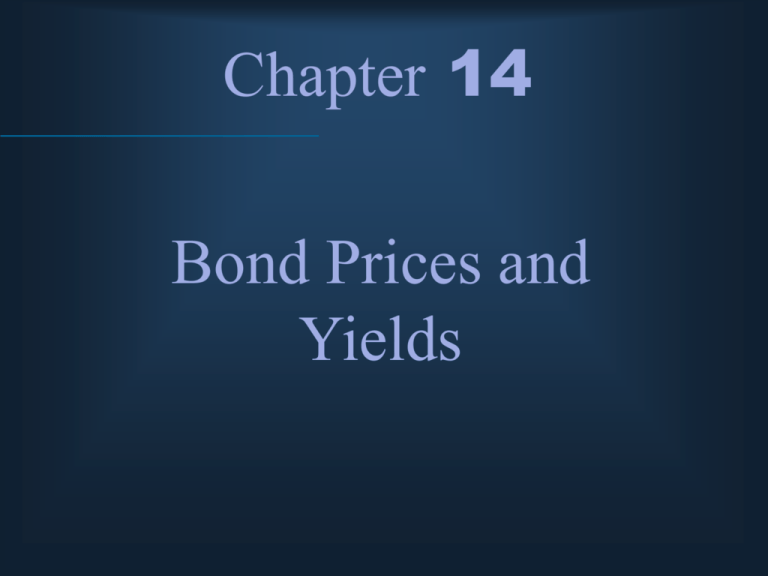
Chapter 14
Bond Prices and
Yields
Provisions of Bonds
•
•
•
•
•
•
Secured or unsecured
Call provision
Convertible provision
Put provision (putable bonds)
Floating rate bonds
Sinking funds
McGraw-Hill/Irwin
© 2004 The McGraw-Hill Companies, Inc., All Rights Reserved.
Bond Pricing
T
PB Ct T
t 1 (1 r )
ParValueT
T
(1 r )
PB = Price of the bond
Ct = interest or coupon payments
T = number of periods to maturity
r = semi-annual discount rate or the semi-annual
yield to maturity
McGraw-Hill/Irwin
© 2004 The McGraw-Hill Companies, Inc., All Rights Reserved.
Price of 8%, 10-yr. with
yield at 6%
20
1
1
1000
t
20
PB 40
(
1
.
03
)
(
1
.
03
)
t 1
P
B
1,148.77
Coupon = 4%*1,000 = 40 (Semiannual)
Discount Rate = 3% (Semiannual
Maturity = 10 years or 20 periods
Par Value = 1,000
McGraw-Hill/Irwin
© 2004 The McGraw-Hill Companies, Inc., All Rights Reserved.
Bond Prices and Yields
Prices and Yields (required rates of return)
have an inverse relationship
• When yields get very high the value of
the bond will be very low
• When yields approach zero, the value of
the bond approaches the sum of the
cash flows
McGraw-Hill/Irwin
© 2004 The McGraw-Hill Companies, Inc., All Rights Reserved.
Prices and Coupon Rates
Price
Yield
McGraw-Hill/Irwin
© 2004 The McGraw-Hill Companies, Inc., All Rights Reserved.
Alternative Measures of
Yield
• Current Yield
• Yield to Call
• Call price replaces par
• Call date replaces maturity
• Holding Period Yield
• Considers actual reinvestment of coupons
• Considers any change in price if the bond is
held less than its maturity
McGraw-Hill/Irwin
© 2004 The McGraw-Hill Companies, Inc., All Rights Reserved.
Premium and Discount
Bonds
• Premium Bond
• Coupon rate exceeds yield to maturity
• Bond price will decline to par over its
maturity
• Discount Bond
• Yield to maturity exceeds coupon rate
• Bond price will increase to par over its
maturity
McGraw-Hill/Irwin
© 2004 The McGraw-Hill Companies, Inc., All Rights Reserved.
Types of Bonds
•
•
•
•
•
•
High Yield vs Investment grades
Example
AAA 5% with .2% historical default
B, 9% with 4% historical default rate
40% recovery rate on defaults
Return = (1 – default rate) * interest rate –
default rate * (1-recovery rate)
• Return for A, .998 * .05 - .002*.6 = 4.87%.
• Return for B, .96 * .09 - .04 * .6 = 6.24%
McGraw-Hill/Irwin
© 2004 The McGraw-Hill Companies, Inc., All Rights Reserved.
Duration
• A measure of the effective maturity of a
bond
• The weighted average of the times until
each payment is received, with the
weights proportional to the present value
of the payment
• Duration is shorter than maturity for all
bonds except zero coupon bonds
• Duration is equal to maturity for zero
coupon bonds
McGraw-Hill/Irwin
© 2004 The McGraw-Hill Companies, Inc., All Rights Reserved.
Duration: Calculation
wt CF t (1 y )
t
Price
T
D t wt
t 1
CFt Cash Flow for period t
McGraw-Hill/Irwin
© 2004 The McGraw-Hill Companies, Inc., All Rights Reserved.
Duration Calculation
8%
Time
Bond years
Payment PV of CF Weight C1 X
(10%)
C4
1
80
72.727
.0765
.0765
2
80
66.116
.0690
.1392
3
1080
811.420
.8539
2.5617
950.263
1.0000
2.7774
Sum
McGraw-Hill/Irwin
© 2004 The McGraw-Hill Companies, Inc., All Rights Reserved.
Uses of Duration
• Summary measure of length or effective
maturity for a portfolio
• Immunization of interest rate risk
(passive management)
• Net worth immunization
• Target date immunization
• Measure of price sensitivity for changes
in interest rate
McGraw-Hill/Irwin
© 2004 The McGraw-Hill Companies, Inc., All Rights Reserved.
Duration/Price
Relationship
Price change is proportional to duration
and not to maturity
DP/P = -D x [D(1+y) / (1+y)
D* = modified duration
D* = D / (1+y)
DP/P = - D* x Dy
McGraw-Hill/Irwin
© 2004 The McGraw-Hill Companies, Inc., All Rights Reserved.
Pricing Error from
Convexity
Price
Pricing Error from
Convexity
Duration
Yield
McGraw-Hill/Irwin
© 2004 The McGraw-Hill Companies, Inc., All Rights Reserved.
Correction for Convexity
Modify the pricing equation:
DP
D Dy 1 Convexity (Dy )2
2
P
Convexity is Equal to:
CF t
2
t
2
t t
P (1 y) t 1 (1 y )
1
N
Where: CFt is the cashflow (interest
and/or principal) at time t.
McGraw-Hill/Irwin
© 2004 The McGraw-Hill Companies, Inc., All Rights Reserved.





